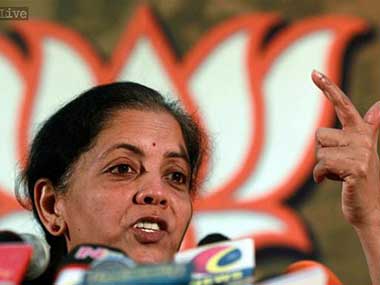N R Mohanty Well, India’s commerce minister, Nirmala Sitharaman’s comments, immediately after the conclusion of the ministerial deliberations in Kenyan capital tells it all. She said: “Most of the commitments given by the WTO to us are carried forward with complete assurance and we have not lost any ground.” [caption id=“attachment_2555690” align=“alignleft” width=“380”]  Commerce minister Nirmala Sitharaman[/caption] This part of her statement is quite defensive; she does not say that India has succeeded in getting any new major concession from these multilateral negotiations dominated by the rich countries. She merely lays claim to the fact that India managed to hold on to the concessions obtained by it in the previous rounds of negotiations. The minister’s other part of the same statement is a kind of letdown for India. She said:” India is disappointed that notwithstanding a large group – India, China, G33, African Union –all of us insisting that Doha has to be reaffirmed, the reaffirmation has been divided. We are thoroughly disappointed on this score.” Well, the minister has reasons to be disappointed on not being able to reaffirm the Doha mandate in the Nairobi conclave, but this development was not unexpected. On December 14, barely a day before the deliberations began at Nairobi, US Trade Representative ambassador Michael Froman wrote in an op-ed piece in the Financial Times: “It is time for the world to free itself of the strictures of Doha Round… Multilateralism – the attempt to reach a comrehensive global deal – is stuck.. Getting it unstuck begins with acknowledging that Doha was designed in a different era, for a different era and much has changed since.” What was the different era? Froman went on to argue that the United States and the European Union were the biggest providers of agricultural subsidy when Doha framework was adopted in 2001; in 2015, Froman said, India and China were the biggest culprits and they could not ask for the concessions envisaged in Doha mandate. Clearly, the US and EU representatives descended at Nairobi with a clear-cut plan: to drive a wedge within the developing nations – between what they called frontline economies such as India and China on the one hand and small and vulnerable economies (SVEs) and least developed and poor nations on the other. And they succeeded in their plan. They said that, if anything, Doha framework needed to be re-configured. India and China protested. Even South African trade minister Rob Davies went on record to say: “Doha mandate has identified certain priorities for the developed and developing countries in which agriculture was the central focus and the needs and priorities of the developing countries were at the heart of the Doha work programme. That is the reason why many of us are not willing to abandon the continuation of Doha process”. But, keeping in view the time-honoured WTO principle of consensus-based decision-making, the reaffirmation of Doha round was kept on hold. That gives rise to a question: why did then India, and for that matter, China and South Africa, not put on hold the export competition pact that the US and EU pushed through? Why did they agree to the leeway of just three years to end the direct export subsidy that gives them the flexibility to act in national interest in certain circumstances? Why did the developing nations not hold up negotiations when they were asked to end even the export subsidy for transport and marketing purposes just after eight years (in 2023)? Well, the US and the EU put out the olive branch that they were ending export subsidy immediately. But these countries are in a different league altogether. Doha Mandate was welcomed by the developing countries (though India’s commerce minister then Murasoli Maran had stoutly objected to the launching of Doha Round in 2001 as the issues raised in Uruguay Round had not been resolved yet) because it explicitly recognised the differential conditions existing in developed and developing countries – that while the US gave support to the tune of $53,000 on a per capita basis to its farmers, the corresponding figure for India was just $200; that too in a situation where the income of an average farmer in US is well above $80,000 and that of an Indian farmer is just about $1200. The American farmer can still live a life of luxury without the state subsidy (the state support is the icing on the cake for them), but the Indian farmer will die of starvation if the state support is withdrawn (even with all the state support, thousands of farmers are committing suicide across the country because of financial distress) That is why, India and other developing countries should not have caved in to the carrot and stick approach adopted by the US and EU. In fact, the carrot is just not there. Just saying that Special Safeguard Mechanism (SSM) would continue in old Hong Kong ministerial format and that Public Stockholding mandate will be discussed in an “accelerated time-frame” is no progress; in fact, it is a regression on what has been achieved so far. The Nairobi mandate is clearly a letdown for the developing nations. The writer is a director at Jagran Institute of management and mass communication, Noida.
Why did then India, and for that matter, China and South Africa, not put on hold the export competition pact that the US and EU pushed through?
Advertisement
End of Article
Written by FP Archives
see more


)

)
)
)
)
)
)
)
)



